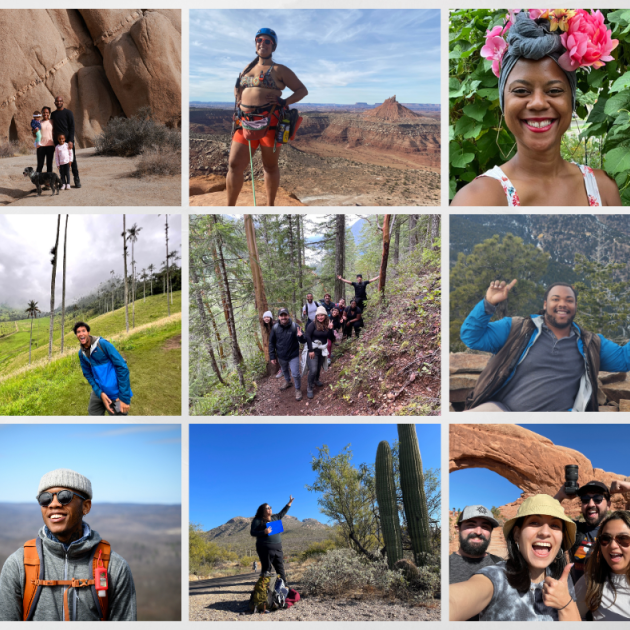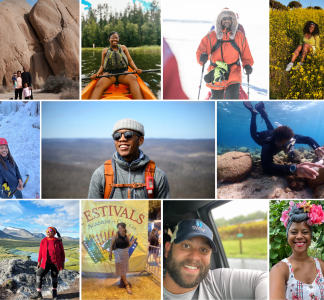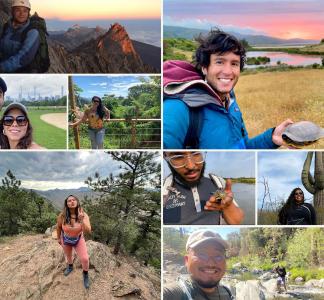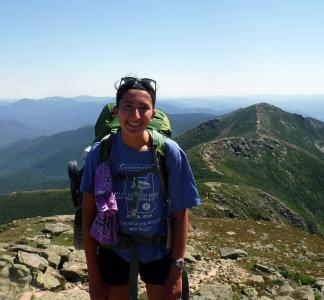All body shapes and sizes should be welcome outdoors
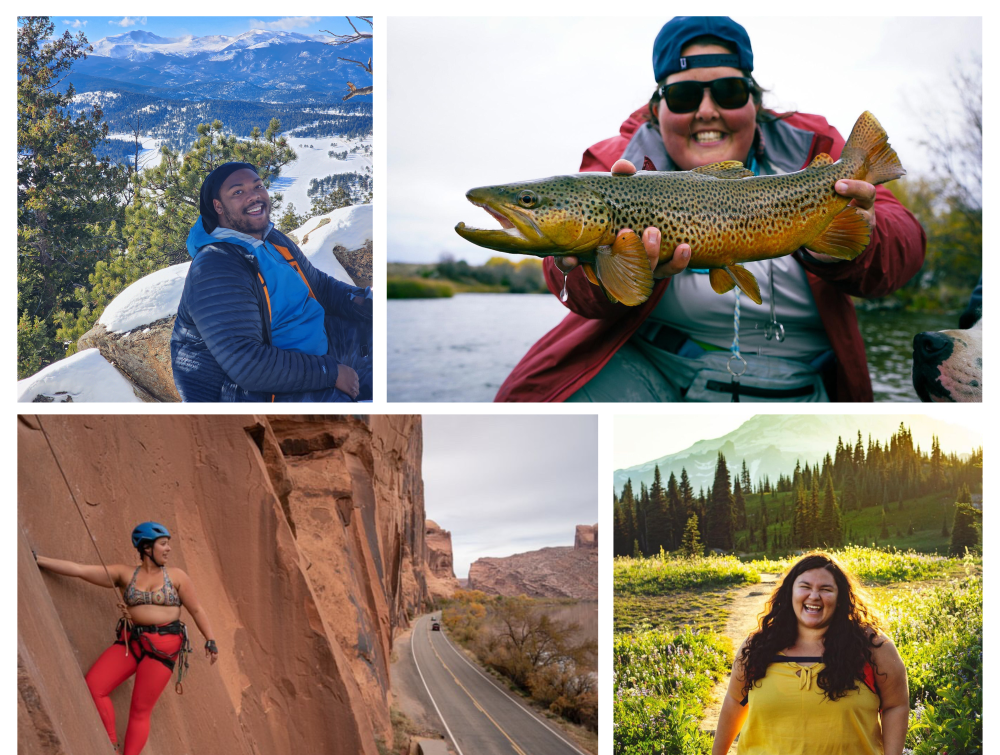
Nelson Holland, Serene Cusack, Bennett Rahn and Sam Ortiz outdoors
Pushing the outdoor narrative to include people of all shapes and sizes
When you're getting ready for a backpacking trip, chances are you start by gathering gear and clothing. But finding clothes and gear that fit every body can be a real challenge. It's not just about looking good — it's also about safety. Imagine trying to hike in the snow without proper protective gear that fits . It could be a matter of life or death.
That’s not to mention comfort (both physical and emotional). If you don't fit the traditional image of an "outdoorsy person," reinforced by outdoor magazines and gear ads that usually feature skinny and toned bodies, it can be tough to feel like you belong. But most of us don't look like that — and that's okay! Being active, fit and healthy is about so much more than just your weight or size.
Advocates are challenging stereotypes and normalizing all bodies in the outdoors.
Part of the problem is that many outdoor clothing companies don’t make sizes beyond XL, even though the average weight among U.S. adults is 181 pounds, which usually translates to an XL size. Also, a lot of outdoor gear - like camping chairs, backpacks and harnesses - have weight limits or aren't made to fit larger bodies. This can make it really tough for people to find gear that's both functional and fits well.
Newer, more inclusive brands are popping up, and even some of the bigger companies are starting to offer more inclusive sizing options. Still, we need to keep working towards a more sustainable and equitable future where everyone feels welcome outdoors —no matter what their body type is.
We spoke with body inclusivity advocates about their connections to the outdoors, what the body inclusivity movement in outdoor recreation means to them and how the outdoors can be more welcoming and accessible. Read their stories below!
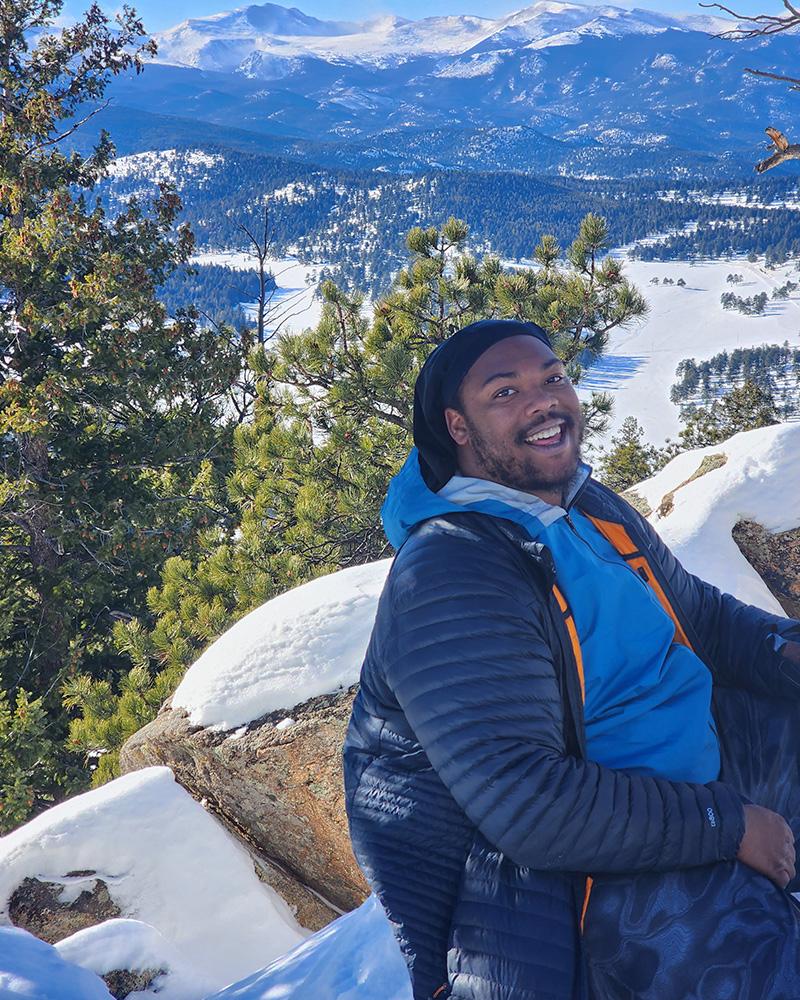
Nelson on top of Evergreen Mountain with Mt. Blue Sky in the background, in Colorado.
Nelson Holland, Colorado
Nelson (he/him) is an outdoor advocate who posts his adventures and joyous times outside on his Instagram and TikTok,. Originally from Long Island, Nelson found himself spending more and more time outdoors when he moved to Colorado. He was in awe of the Rocky Mountains, so he started exploring, hiking and spending time in nature.
At first, he posted beautiful photos and videos of bison and other natural wonders hoping to sell his photography. Then he made a video that included himself, and he started to gain quite a large following, particularly from plus-size people who loved nature but often felt excluded from outdoor activities. Nelson soon dedicated his platform to amplifying the voices of people who faced similar challenges, and to also advocate for accessible trails.
“Hearing from people made me want to start posting more and tell people about these experiences. And I started learning about a lot of the issues, including accessibility at trails. A lot of people reach out to me, and I try to share the knowledge. I believe everyone can benefit from making trails more accessible.”
While the outdoors is for everyone, it is crucial to ensure that everyone has equal access to these spaces, says Nelson. It is important to have a more diverse group of people at the table to discuss conservation efforts and preserve our natural resources. Nelson believes that by promoting accessibility, representation and diverse perspectives, we can preserve our natural resources for generations to come.
Efforts are underway to make nature more accessible, such as providing track and motorized chairs in state and national parks. While there should be more accessible parks, it's important to know that they do exist. He believes there is a need for better advertising and marketing to let people know about the different options for getting outside, like buses. People may also need additional support in the form of clear trail signs and accessible paths to help them navigate and participate in outdoor activities. Nelson will continue to use his platform to inform people about accessibility at parks and the joy of being outdoors.
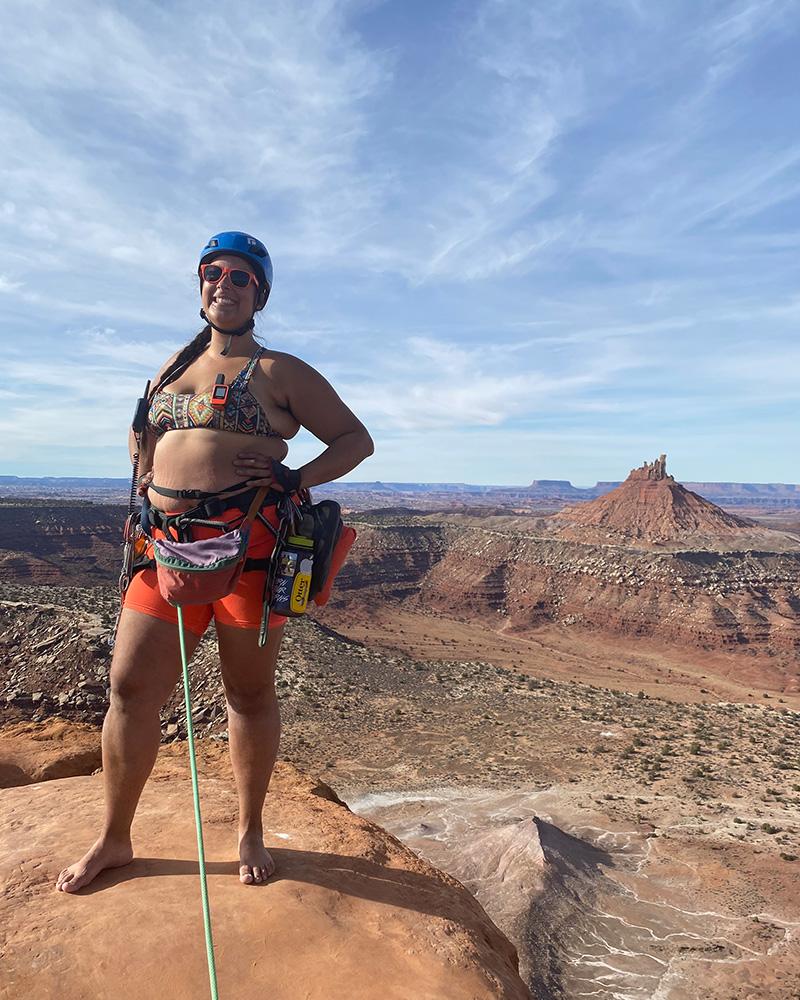
Bennett standing on top of a red sandstone rock on the summit of South Six Shooter in Indian Creek, Utah.
Ilana Newman
Bennett Rahn, Washington
Bennett (she/her) is a plus-size outdoor athlete, climber and budding skiier. Bennett works with brands to expand their sizing, understand the plus-size market, and understand what plus-size folks need and how they would like to be treated. She uses her social media platforms to challenge those stereotypes that have led plus-size people to be historically excluded from the outdoor recreation conversation.
Bennett grew up appreciating nature, but it wasn’t until after completing The Camino (El Camino de Santiago, a network of pilgrimages leading to the shrine of the apostle Saint James the Great in the cathedral of Santiago de Compostela in Spain) that she realized she wanted to spend more time outside. She started skiing and mountaineering. Bennett wants others who look like her to make sure they know they can also do these things, too.
“I want to show people that I can be just as technically proficient if not more than you are at all of these things. I might not climb as hard, but that doesn't mean I'm not a climber. That doesn't mean that I can't do really rad cool stuff, too!”
Bennett shared that she sometimes feels like the odd one out in these outdoor spaces, being the only fat person among a sea of thin individuals. This feeling of being different and not belonging can be a barrier to entry for many people, but having supportive friends and mentors can help bridge the gap. Finding a community of like-minded people who can offer support, guidance and encouragement is essential for anyone pursuing outdoor activities.
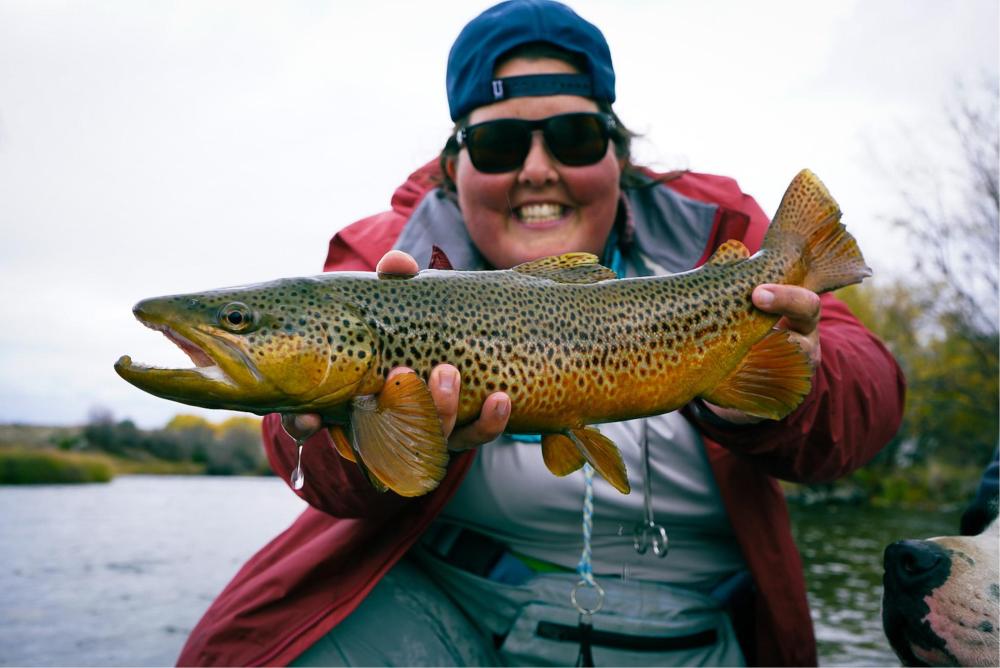
Serene with a beautiful brown trout in the Madison River Valley in Montana.
Bri Dostie
Serene Cusack, Montana
When Serene (she/her) isn’t working as a social worker for adolescent inpatient psychiatric care, she’s probably on the water fly fishing. She details and posts her experiences on her Instagram and uses her platform to advocate for more inclusion in the fishing industry. Growing up in Montana, Serene says she was fortunate to have spent a lot of time outside, surrounded by mountains and nature. She grew up skiing (her first love!), riding bikes and playing in the woods. Even though she started fly fishing in high school, it wasn’t until college that she really became proficient at the sport.
Serene says that while she never felt like she had to fight for her place outdoors, she does feel like she’s had to earn her place to stay outside, especially when it comes to fly fishing. That’s because there are still not enough size-inclusive options in outdoor gear and apparel—something she feels must change, especially when it comes to safety equipment like waders or wading belts.
“People are already out there doing this [fly fishing, outdoor activities]. We're already here, we're already doing it. And the blatant disregard for creating things that fit and work for everyone is a result of power dynamics or simply of a desire to put blinders on and say: these people aren't doing this.”
Thankfully, there are companies creating more size-inclusive options for outdoor gear, such as fishing waders and boots. However, this wasn't always the case and there are still limitations. Serene says she wasn’t able to access certain rivers or fish during colder months until recently, when a company started making size-inclusive waders during the pandemic.
Together with her partner, Serene created Confluence Collective, a collective of anglers working to ensure a place for every body on the water by arranging group outings, fly fishing and camping trips. Everyone has a right to spend time outside and enjoy the beauty of nature, says Serene. It's up to all of us to create a more inclusive outdoor community and support those who have been traditionally marginalized.
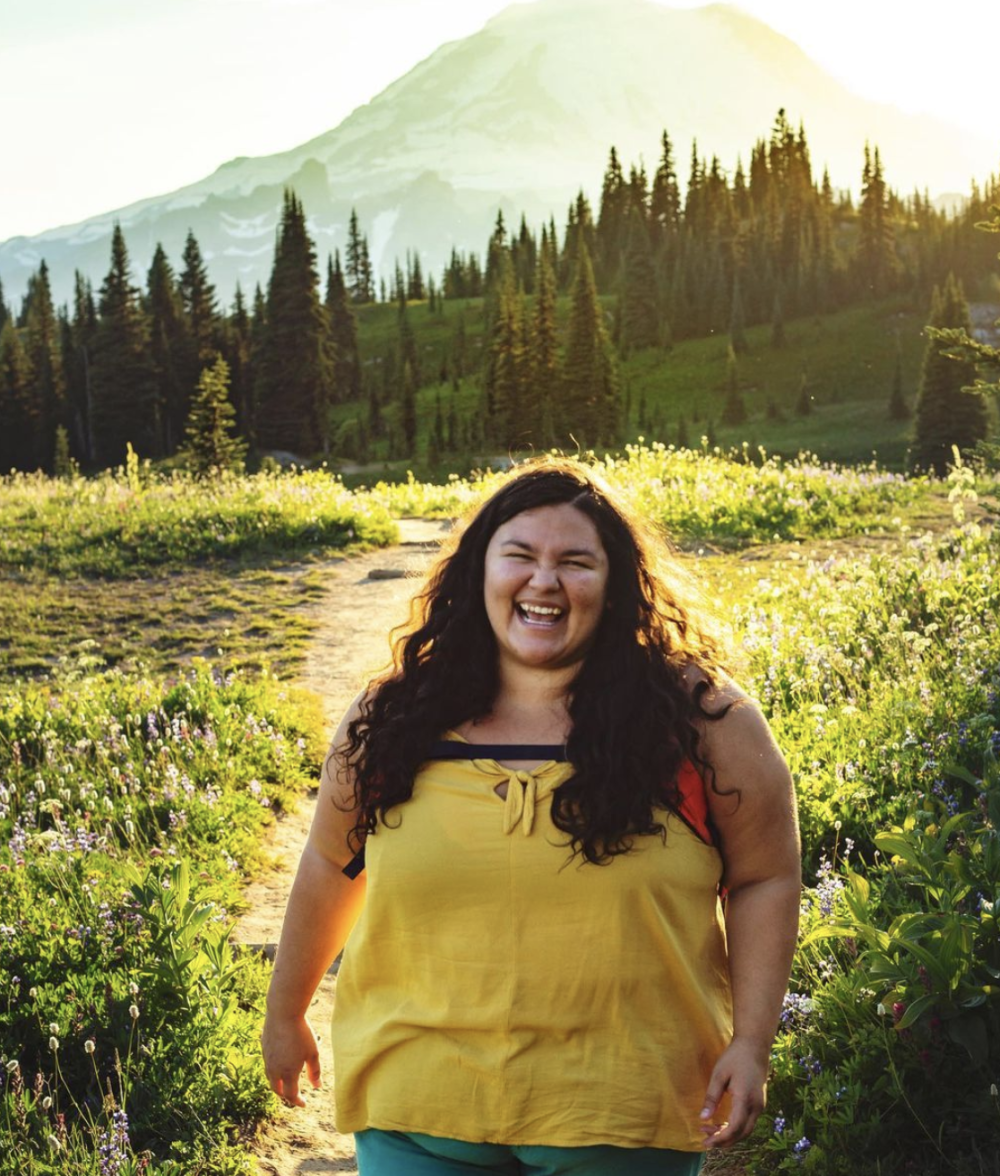
Sam at Mount Rainier National Park, Washington.
Sam Ortiz, Washington
Sam (she/her), originally from Kentucky but now living in Western Washington, is a plus-size adventurer, photographer, climber, marketing specialist and founder of Climb Big, a group that looks to make climbing more accessible.
While Sam loved nature growing up, she never did “outdoorsy” things. She never saw anyone who looked like her recreating outside, so unconsciously she thought that the outdoors was not a place she could go. It wasn’t until after graduating college, when she moved to Alaska, that she “discovered” the outdoors. She found a mentor who taught her everything. At one point, Sam hiked a mountain—something she’d once assumed was impossible. When she finished, she felt empowered and strong.
Since then, Sam has really tried it all (or, almost all!): hiking, rock climbing, mountaineering, kayaking, backpacking. She’s even attempting gardening. (You can follow Sam on her social media pages). She wants people to know anyone can do those types of outdoor activities, and she shares tips for people with bodies similar to hers about how to get started. Sam believes strongly in mentorship and wants to be the catalyst for positive change in her community. She says small local initiatives (like special hiking groups) may seem insignificant, but they have immense power in making outdoor spaces more accessible and inclusive.
“When you're in a body that's outside of a certain size range, it sends a message that nobody thinks you belong here and nobody thinks that you can do this. That's part of the reason why I want to try all the different things. To figure out what does work so that I can share that with people. And they can be excited to do these things too.”
Sam wants everyone to have access to outdoor spaces, because she believes they are crucial for mental and physical health. Being outside and engaging in joyful movement, such as hiking up a mountain, is one of the only ways she feels fully engaged and happy.
The more people who have access to outdoor spaces, the more likely they will want to protect it for future generations, she said. Protecting our planet is intricately connected to protecting those places closest to where you live.
